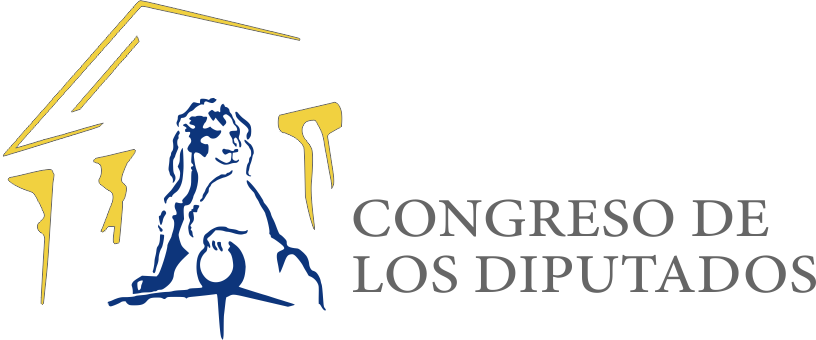|
What is the Congress of Deputies?
The Congress of Deputies: features and constitutional functions
I. GENERAL FEATURES
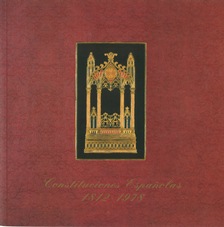 Portada del Libro “Constituciones Españolas. Portada del Libro “Constituciones Españolas.
1812-1978”, editado por el Congreso de los
Diputados en 1998. Ilustración de la cubierta:
Contracubierta decorada “a la catedral” de la
Constitución de la Monarquía española, año
de 1837The Constitution of Cádiz of 1812 represents the first precedent of the New Regime and of the Modern Parliament. The Royal Statute of 1834 established the bicameral system that prevailed throughout the 19th and first third of the 20th centuries. Under the 1837 Constitution the Chambers adopted their current names, which were recovered with the reinstatement of the democratic system in 1977 and were definitely enshrined in the text of the 1978 Constitution.
The exception to this bicameralism was the Constitution of Cádiz and that of the 1931 2nd Republic, both of which retained the Congress of Deputies as single Chamber. Later, during the Franco years, a single-Chamber Cortes was established (1942-1977), albeit without the features of a true Parliament.
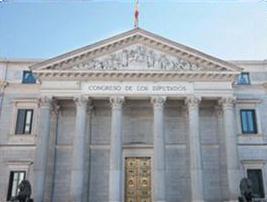 Pórtico frontal del Palacio del Congreso. Pórtico frontal del Palacio del Congreso.
Fuente: Congreso de los Diputados
Pursuant to the 1978 Constitution, the Cortes Generales are made up of the Congress of Deputies and of the Senate and represent the Spanish people, a representation with which the MPs are likewise vested, since each one of them represents the Nation, and for this reason they are not bound by compulsory mandate. The functions of the Cortes Generales are to adopt the laws and the State General Budget, as well as holding the Government to account. However, bicameralism does not mean that the Congress and the Senate are entirely equal. The Congress of Deputies has a number of roles and powers that denote its predominance as regards political oversight, such as the investiture of the President of the Government or his/her removal from office; likewise, legislative initiatives and the Budget are initiated in the lower Chamber, whilst the Senate is the Chamber for territorial representation.
The provisions in force (Organic Act on the General Electoral Regime of June 19, 1985) assign 350 members to the Congress. All of them are elected by provincial constituencies and universal suffrage, free, equal, direct and secret. The system is proportional, thus, each party obtains a number of seats in proportion to its votes.
The Legislative Term is the period for which the Congress of Deputies and the Senate is elected. It lasts four years, although it can be cut short if the President of the Government decides to dissolve the Parliament.
Aspecto del Salón de Sesiones durante un día de Pleno de la XIV Legislatura.
Fuente: Congreso de los Diputados
|
|
II. FUNCTIONING AND ORGANIZATION
The Congress of Deputies is governed by the Constitution and the Standing Orders that the Chamber adopts with full autonomy. It meets within the periods of sessions laid down by the Constitution, namely two per natural year, the first from February to June and the second from September to December. Outside these periods there is the Permanent Deputation, which safeguards the powers of the Chamber. However, usually extraordinary sittings of the Plenary, Committees and the rest of the bodies of the Chamber are convened outside the aforementioned ordinary periods of sessions.
Apart from the Plenary, which is made up of all the members of the Congress, the Chamber has several bodies which form two major categories: steering or governance bodies, on the one hand, and working bodies, on the other. The first, which arrange, drive and steer the Chamber are the Presidency, the Bureau and the Board of Party Spokespersons. The working bodies are those directly involved in parliamentary activities, whether it be preparing the debates and decisions of the Plenary, or settling the matters themselves: Committees, Subcommittees, Reporting Subcommittees, Permanent Deputation and the General Secretariat or Parliamentary Administration.
The Speaker is vested with the representation of the Chamber and is elected by the Chamber itself at the onset of the Legislative Term.
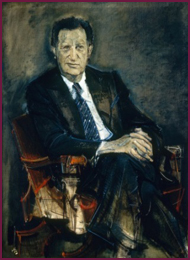 |
 |
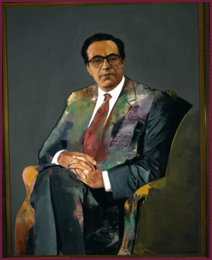 |
 |
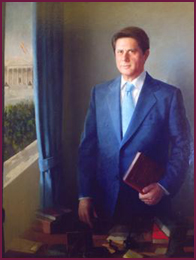 |
 |
 |
 |
 |
 |
 |
 |
| Speakers from 1977 to date: Mr. Fernando Álvarez de Miranda y Torres; Mr. Landelino Lavilla Alsina; Mr. Gregorio Peces-Barba Martínez; Mr. Félix Pons Irazazábal; Mr. Federico Trillo-Figueroa Martínez-Conde; Ms. Luisa Fernanda Rudi Úbeda; Mr. Manuel Marín González; Mr. José Bono Martínez; Mr. Jesús Posada Moreno; Mr. Patxi López; Ms. Ana Pastor Julián and Ms. Meritxell Batet. Pictures taken from the website of the Congress of Deputies. |
The Bureau is the collegiate steering body of the Chamber. It consists of the Speaker of the Congress, four Deputy Speakers and four Secretaries, and it is assisted and counselled by the Senior Clerk or Secretary General.
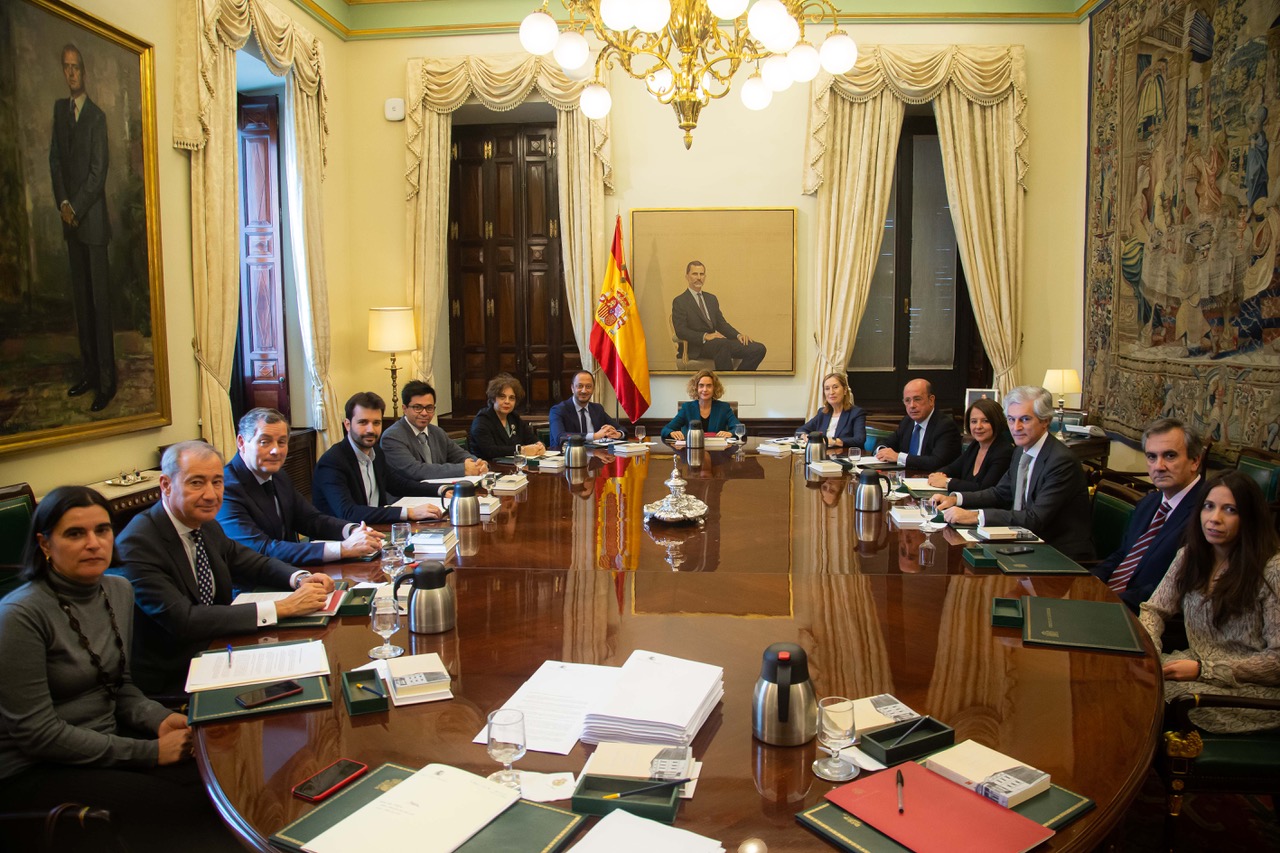 Meeting of the Bureau of the Chamber during the XIV Legislative Term. Source: Congress of Deputies.
The Board of Party Spokespersons is the body through which parliamentary groups take part in arranging the work of the Chamber. Its main function is to adopt, together with the Speaker, the agenda of the Plenary.
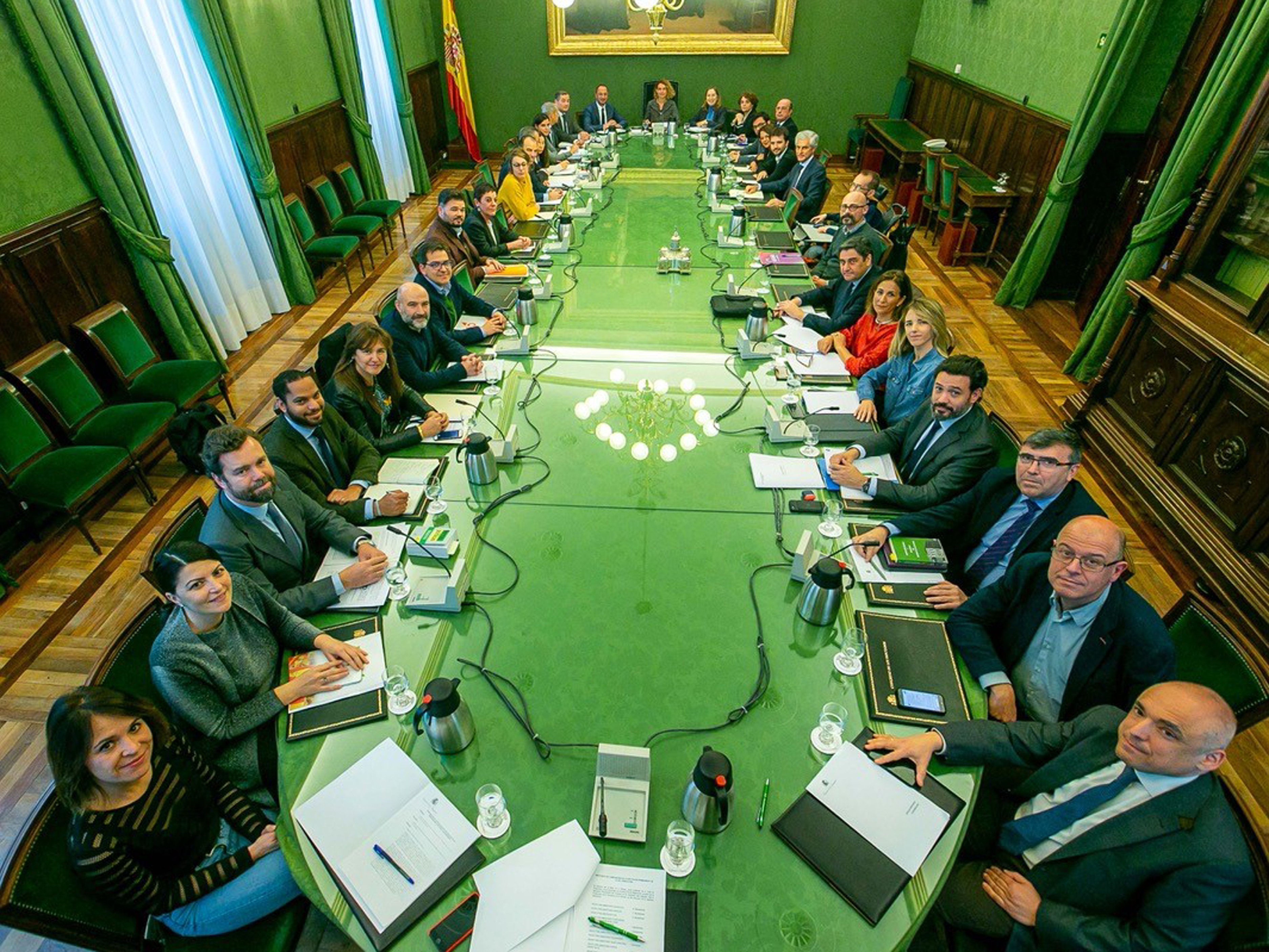
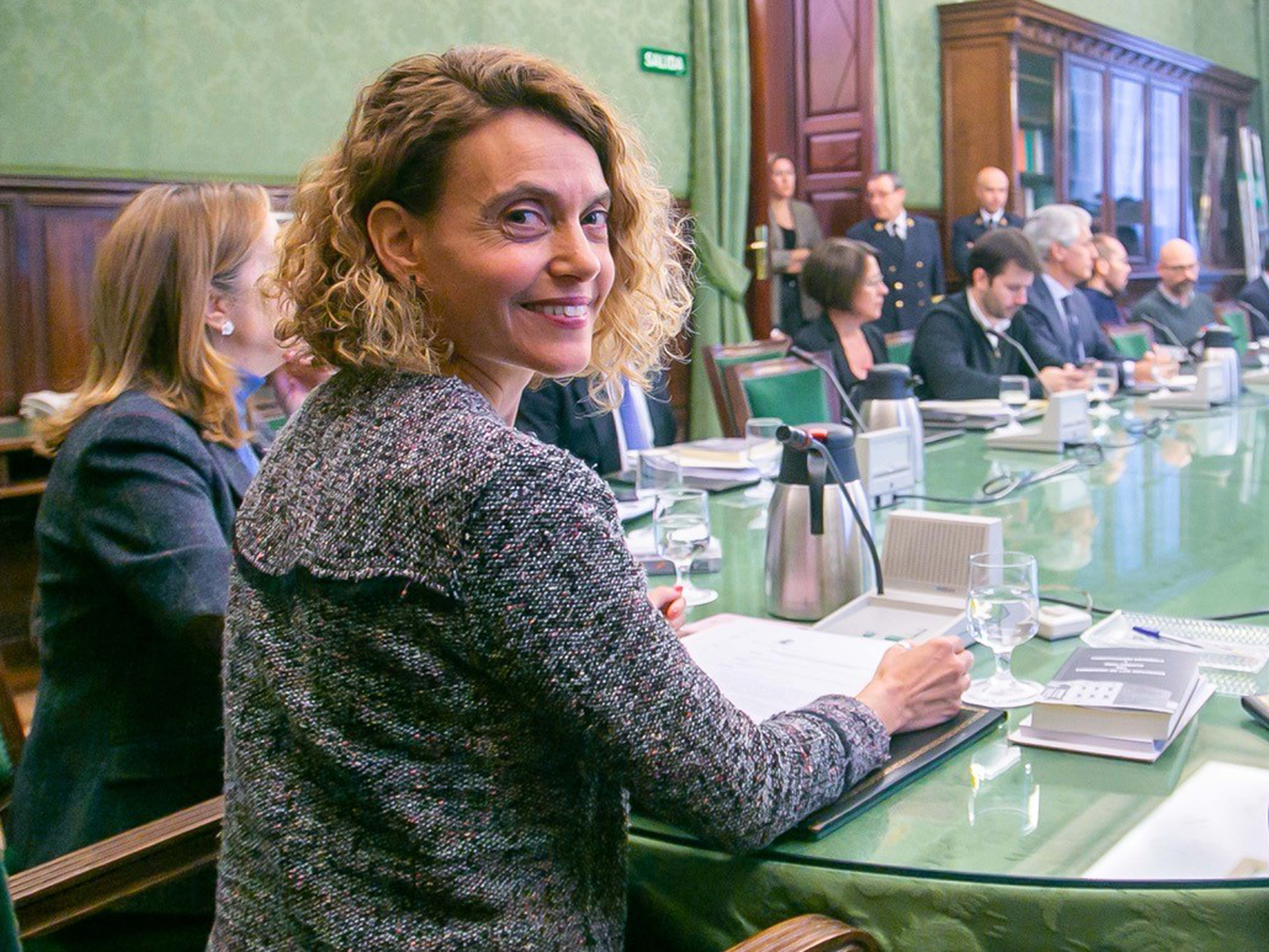 Different views of a meeting of the Board of Party Spokespersons during the XIV Legislative Term. Source: Congress of Deputies.
Committees are the working bodies that prepare the Plenary’s decisions or replace the latter in certain specific cases. They shall consider any Government bills, non-governmental bills or any other business referred to them by the Bureau of the Congress within their area of responsibility. They shall consist of the members designated by each parliamentary group in a number as shall be determined by the Bureau of the Congress, upon consultation with the Board of Party Spokespersons and in proportion to the number of each group in the House. They can be standing legislative Committees, standing non-legislative Committees (Standing Orders, Statute of MPs, Petitions and those set-up by legal provision) and non-standing, such as the Inquiry Committees.
Sub-Committees and Reporting Subcommittees are specialized working bodies set up within Committees.
Parliamentary Groups play an essential role in the internal proceedings of the Congress and represent the main axes of its activities.
|
|
III. THE LEGISLATIVE FUNCTION
The main function of the Congress is the legislative one, namely, to adopt the laws.
The Constitution places legislative initiative in the hands of the Government, the Congress of Deputies, the Senate and the Autonomous Regions’ Assemblies. Likewise, there is popular legislative initiative, whereby the proposal is made by a group of no less than 500,000 citizens and in accordance with the organic law implementing it.
The initiative, named Bill when tabled by the Government and Legislative Proposals in the rest of cases, is always submitted to the Congress of Deputies. The exception are Bills tabled by the Senate which after being considered in the Upper Chamber must be referred to the Congress of Deputies. The consideration of the Interterritorial Compensation Fund is not initiated in the Congress either. After a bill or legislative proposal is tabled, and once the Bureau has qualified it, it shall be published. If it is an initiative tabled by Deputies, a Regional Assembly or on popular initiative, it shall go through the consideration stage, namely undergo a debate and vote in the Plenary on its pertinence. Government bills and legislative proposals stemming from the Senate are exempt from this procedure.
Once a bill tabled by the Government is published, or once the House resolves to take a legislative proposal into consideration, a deadline begins for tabling amendments to the whole text or to sections thereof. The first can only be tabled by parliamentary groups. If the amendments tabled are to the whole of the bill or legislative proposal, there shall be a first debate on the whole initiative in the Plenary.
If the amendment to the whole is approved, the initiative is taken to be rejected. If an alternative text amendment is approved, a new deadline for amendments begins and the latter shall only be to sections of the initiative. If they are rejected, the bill or legislative proposal shall be returned to the relevant Committee to continue its consideration.
The Committee shall appoint the Reporting Subcommittee, which is made up of members pertaining to the different parliamentary groups of the Chamber and whose number shall be fixed by the Bureau at the onset of the Legislative Term. This body, counselled by a Clerk, meets behind closed doors to study the various amendments tabled and submits a report to be subsequently discussed by the Committee. Once the debate within the Reporting Subcommittee is finished, the Committee meets publicly to discuss and vote the amendments to the text and issues an opinion.
Once the Committee has completed its work, it is included on the order of business for the Plenary, where a debate is held on the Bill or legislative proposal and any outstanding amendments. The resulting text is then referred to the Senate.
When it receives a legislative text from the Congress of Deputies, the Senate may adopt amendments to the sections or may choose to veto the whole text. If that is the case, the text subject to veto is returned to the Congress which, by absolute majority or simple majority after a deadline of two months, may lift the veto and by simple majority approve or reject the Senate’s amendments. Once the law is finally adopted, it shall go to Royal Sanction and promulgation by H.M. the King and to its subsequent publication in the Official State Gazette.
Apart from the procedure described above, the Standing Orders of the Congress provide for other special procedures, such as those applicable to Organic Acts, the Budget Bill, the Statutes of Devolution, constitutional review, full legislative delegation in Committees and single-reading procedure. In addition to adopting laws in the strict sense, the Congress of Deputies endorses or repeals Decree-Laws, authorizes international treaties and conventions and monitors the exercize of legislative delegations.
|
|
IV. THE OVERSIGHT AND STIMULUS FUNCTION
Upon holding general elections and in all other cases resulting in the removal of the Government (parliamentary vote of no confidence, resignation or death of the President) the procedure for investing a new President of the Government begins. To this effect, the King, upon consultation with the political groups with parliamentary representation, suggests a candidate President of the Government to the Congress. The candidate, after submitting his or her political programme, must be endorsed by an overall majority of members. If the said majority is not achieved, he or she may be elected if he or she obtains a simple majority in a second vote conducted 48 hours later.
Ministers are not appointed by the Chamber but by the King at the proposal of the President of the Government.
The Government is to step down if its bond of confidence with the Congress of Deputies is breached by the passage of a motion of censure or the rejection of a question of confidence. The motion of censure must include the submission of an alternative candidate so that, if approved, in the same act a President is removed and a new one elected. A question of confidence may only be submitted by the President of the Government prior consultation with the Council of Ministers, and it must refer to his or her political programme or to a statement on general policy. If a simple majority is not reached, the Government must step down and a procedure begins to invest a new President of the Government.
The Congress of Deputies oversees and scrutinizes actions of the Government and the Public Administration, mainly by means of questions and interpellations. Questions, which may be oral or written, must refer to any matter falling within the competences of the Government, whilst interpellations shall deal with the Executive’s actions regarding questions of general policy, either on the part of the Government or of a specific Ministry.
Non-legislative proposals, motions and proposals for a resolution are similar in nature, in the sense that they allow the Congress of Deputies to adopt a non-legislative agreement by means of which the Congress can state its position on a specific matter or problem, or urge the Government to take a specific action.
The Congress of Deputies and the Senate appoint the Ombudsperson and eight members of the Constitutional Court, as well as those of the General Council of the Judiciary, the Court of Auditors and other bodies.
|
|
